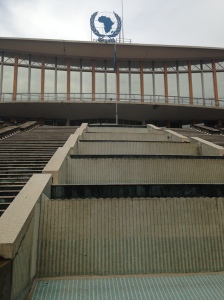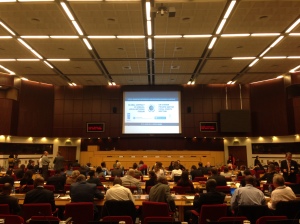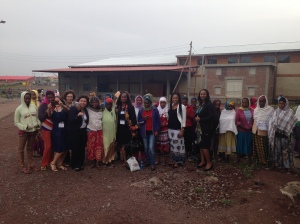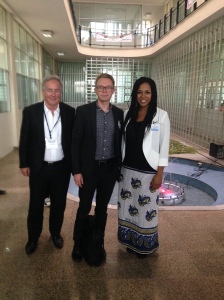 I was invited by the World Intellectual Property Organization (WIPO) to be a panelist during the 2 day UN Global Compact Conference in Addis Ababa, Ethiopia.
I was invited by the World Intellectual Property Organization (WIPO) to be a panelist during the 2 day UN Global Compact Conference in Addis Ababa, Ethiopia.
The UN Global Compact Conference, held on June 9 + 10, 2014, convened 300 public and private sector players from across the continent to facilitate knowledge sharing for local, regional and continental planning. The organizers did a great job in accomplishing something that is no small feat, bringing together U.N. agencies, NGOs and various companies from the private sector (such as consulting firms, BoP technical assistants and regional financial institutions) to discuss ways to come together to discuss the problems facing small and medium size enterprises (SMEs) in Africa.
The setting was the rather impressive: The UN Economic Council on Africa building is housed just minutes away from the Palace. The building, like much of the city of Addis, was partly under renovation, but that did nothing to take away from the feeling I had once we stepped onto the grounds: the people who worked there meant business. In fact, Addis Ababa is home to other convening bodies in Africa like The African Development Bank and the African Union. The city’s air of power, influence and rebirth is evident by the people who live and work there. And for the first time, The UN Global Compact decided to have their conference in the very place where it mattered the most: on the continent.
It was great to see so many different players committed to exploring how we can strengthen public-private partnerships. As I see it, there are two distinct challenges that have to be overcome to deepen the impact of these discussions.
The Main Challenges
First, we need to be clear about the specific ways our organizations want to support economic development, whether a company or organization has specific country, regional, or Pan-African goal they are trying to accomplish. The goals of a company like Coca-Cola has around investing in a local business will look very different than a local UNDP office trying to bring more services to local entrepreneurs. The question then to ask ourselves and our colleagues is: exactly how do we want to impact the communities we serve? Where are we lacking? How can we partner with an organization that has had success to close our gap? How can we pool resources together to accomplish a single mission?
Second, we need to have the mindset of open and inclusive knowledge sharing with local experts. To accomplish this we need to find more robust ways of working together to create environments to which foster economic growth and equitable opportunities.
Supporting Technology Hubs, Long Term
There were two panels I spoke on. The first was about strengthening public-private partnerships to support SMEs. One of my big points, was that we need a coalition of public and private supporters to pool resources to support entrepreneurship and training hubs. I am convinced this is one of the most overlooked ways to drive economic growth AND job development for youth.
What could this look like?
Think of what could be done if, similar to the Virgin Entrepreneur labs, multinationals committed $20 million USD to fund technology hubs that provide skills and training for youth? With $100,000 committed to each hub, say, in the AfriLabs Network, this could mean 3 years of organizational support for over 60 similar hubs across the continent, with $2 million to spare for a yearly convening event and small M+E team.
There are nearly 100 innovation hubs in Africa most of which are struggling to survive. I’ve spoken with many their managers who share the same concerns and struggles, lack of finance opportunities and their inability to come up with sustainable models. Their fears are often the same: “How many more months can we keep our doors open and provide consistent programming for our communities?”
If a public-private consortium came together with a larger operational grant, similar to but on a larger scale as Hivos and Indigo Trust’s recent TECH HUB INITIATIVE, we could scale up opportunities for youth to have consistent access to vibrant innovation hubs where staff salaries, internet connectivity, and space is stable.
Tech Hub sustainability will rely on committed partners, mentors and managers to determine what services they can provide their market that will add value to local businesses. This doesn’t mean renting desks or holding events. It means harnessing the power of the tech developers and organizers within the hub to provide expertise that companies are lacking. Until those gaps are filled, tech hubs will have a difficult time staying alive.
Strengthen Intellectual Property (IP) resources across the continent
For the second panel discussion, WIPO hosted a trip outside the city to the rather impressive Oromia Coffee Cooperative, where the Ethiopian organization has successfully licensed the use of coffee for the world market. As most of you may know, Ethiopia is the birthplace of coffee. The Oromia team welcomed us with a facilities tour, special coffee ceremony and presentation about the growth of the cooperative and how their model has helped increased economic growth for the region as well as health and training services for the workers (most of those in the factory were women).
The market for coffee globally is massive and it’s Ethiopia’s primary export. Ron’s team assisted the Ethiopian government in receiving a fair share of that profit, and getting fair trade coffee retailers such as Green Mountain Coffee and Starbucks to agree to paying Ethiopian exporters for these licenses. My other panelist, Ilmari Soininen from Sanaa Consulting, spoke on the importance of these type of IP initiatives in strengthening trade relations on the continent.
From a technology perspective, I spoke about registering and protecting the IP of young African entrepreneurs- something that WIPO is keen to work on in the coming years. The point here is, if technologists can’t protect their IP, then they cannot reap the type of success and growth that their American and European counterparts have.
As we concluded the conference, there was a strong feeling of commitment to work together to create the type of equitable and stable environment for economic development that other regions have enjoyed.
It’s up to us keep working to make this happen.
-Bahiyah










